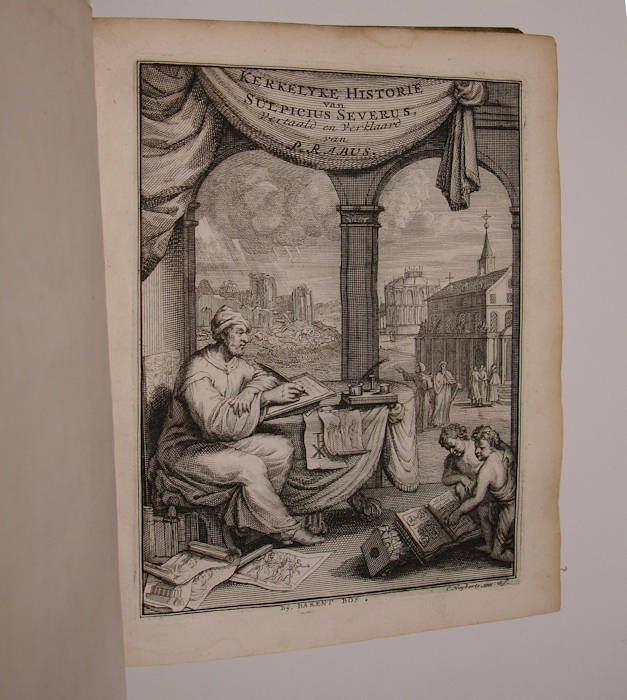SULPICIUS SEVERUS.
Kerkelyke Historie van Sulpicius Severus. Sedert des Weerelds aanvang, tot het vierhonderdste jaar na Christus geboorte; vervolgd tot den tijd van Keizer Karel den V. Uit het Latijn vertaald, en met uitvoerige aanmerkingen verrijkt door Pieter Rabus. Met privilegie van d'Ed. Gr. Mog. Heeren Staten van Holland en West-vriesland.
Rotterdam (Te Rotterdam), By Barent Bos Boekverkooper, 1702.
4to. (XXXIV),560 p., frontispiece, 2 plates. Overlapping vellum 21 cm (
Ref: STCN ppn
216756308; OiN 355) (
Details: 6 thongs laced through the joints. Frontispiece by C. Huyberts, depicts Sulpicius in his study writing his 'Sacrae Historiae'. Title in red and black. Woodcut printer's mark on the title, depicting the goddess of wisdom Athena, surrounded by a great number of books; it's appropriate motto: 'Non curta supellex', 'not an ill-furnished mind/library'. The other 2 engraved plates show biblical and historical scenes) (
Condition: Binding slightly soiled and scratched) (
Note: The first ecclesiastical histories in the Latin West were translations of Greek historians. Hieronymus translated the 'Chronicon' or 'Chronicle' (Pantodapê historia / Universal history) of Eusebius, bishop of Caesarea, to which he added a continuation of his own up to 378 A.D. And the monk Tyrannius Rufinus translated Eusebius' 'Church History' (Ekklêsiastikê historia). It was published in 402 or 403, and continued the work from the reign of Constantine the Great to the death of Theodosius (395). It was published in 402 or 403. The first independant Church History in the West was written by Sulpicius Severus, ca. 363-420, an eminent Latin-Christian historian originating from South-West Gaul. His 'Sacrae Historiae', or 'Chronica' appeared in 402. The 'Sacrae Historiae' or in Dutch 'Kerkelyke Historie', tells the 'sacred history' from Adam till ca. 400 A.D. This is the first and up till now the only complete Dutch translation. Sulpicius is not only translated, but also 'met opmerkingen opgeheldert', i.e. elucidated with notes. In them the translator Pieter Rabus criticizes Severus. The notes usually occupy more than half a page. Pieter Rabus, 1660-1702, was a famous man of letters in his days. He also translated Erasmus. As an enlightened author and journalist he wrote against superstition and intolerance. In 1686 he became 'Praeceptor' of the Erasmianum in Rotterdam. After 'Kerkelyke Historie' of Sulpicius follows a translation of the continuation of the 'Chronica' by Johannes Sleidanus, 1507-1556, 'De quattuor summis imperiis'. This part comprises the last 110 pages and deals with the history of the church during the Middle Ages. (J.J.V.M. de Vet, 'Pieter Rabus (1660-1702)', Amsterdam, 1980) (
Collation: [*]4, 2*-4*4, 5*2 (minus blank leaf 5*2), A-4A4) (Photographs on request)
Book number: 130099 Euro 150.00
Keywords: (Oude Druk), (Rare Books), Altertum, Altertumswissenschaft, Altphilologie, Antike, Antiquity, Dutch translations, Kirchengeschichte, Spätantike, Sulpicius Severus, church history, classical philology, early christianity, frühes Christentum, late antiquity
 SULPICIUS SEVERUS.
SULPICIUS SEVERUS.

